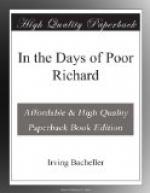Old Kiodote knew Solomon and remembered Jack, whom he had seen in the great council at Albany in 1761.
“He says your name was ‘Boiling Water,’” Solomon said to Jack after a moment’s talk with the chief.
“He has a good memory,” the young man answered.
The two white men were invited to take part in the games. All the warriors had heard of Solomon’s skill with a rifle. “Son of the Thunder,” they called him in the League of the Iroquois. The red men gathered in great numbers to see him shoot. Again, as of old, they were thrilled by his feats with the rifle, but when Jack began his quick and deadly firing, crushing butternuts thrown into the air, with rifle and pistol, a kind of awe possessed the crowd. Many came and touched him and stared into his face and called him “The Brother of Death.”
3
Solomon’s speech that evening before the council fire impressed the Indians. He had given much thought to its composition and Jack had helped him in the invention of vivid phrases loved by the red men. He addressed them in the dialect of the Senecas, that being the one with which he was most familiar. He spoke of the thunder cloud of war coming up in the east and the cause of it and begged them to fight with their white neighbors, under the leadership of The Great Spirit for the justice which He loved. Solomon had brought them many gifts in token of the friendship of himself and his people.
Old Theandenaga, of the Mohawks, answered him in a speech distinguished by its noble expressions of good will and by an eloquent, but not ill-tempered, account of the wrongs of the red men. He laid particular stress on the corrupting of the young braves with fire-water.
“Let all bad feeling be buried in a deep pool,” Solomon answered. “There are bad white men and there are bad Indians but they are not many. The good men are like the leaves of the forest—you can not count them—but the bad man is like the scent pedlar [the skunk]. Though he is but one, he can make much trouble.”
Every judgment of the league in council had to be unanimous. They voted in sections, whereupon each section sent its representative into the higher council and no verdict was announced until its members were of one mind. The deliberations were proceeding toward a favorable judgment as Solomon thought, when Guy Johnson arrived from Johnson Castle with a train of pack bearers. A wild night of drunken revelry followed his arrival. Jack and Solomon were lodging at a log inn, kept by a Dutch trader, half a mile or so from the scene of the council. A little past midnight, the trader came up into the loft where they were sleeping on a heap of straw and awakened Solomon.
“Come down the ladder,” said the Dutchman. “A young squaw has come out from the council. She will speak to you.”
Solomon slipped on his trousers, coat and boots, and went below. The squaw was sitting on the floor against the wall. A blanket was drawn over the back of her head. Her handsome face had a familiar look.




